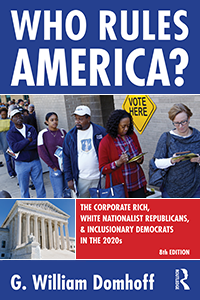Table of Contents

Introduction: Setting the Stage for What Follows
- Keeping Power and Politics in Perspective
- A Guide to What Follows
Chapter 1: Concepts, Definitions, and Power Indicators
- Power Is a Relationship: The Social Science View of Power
- The Social Psychology of Being Powerful Or Powerless
- The Four Major Power Networks
- Cultures of Resistance, Cultures of Resentment
- There Have Been No Conspiracies to Take Over the Government
- What Does "Power" Mean in American Culture?
- Social Classes, According to Social Scientists
- How Do Americans Perceive Social Classes?
- Class, Caste, and Colorism in the United States
- Three Power Indicators
- Conclusion
Chapter 2: The Corporate Community
- Introduction
- The General Contours of the Corporate Community
- The Unexpected Origins of the Corporate Community
- The Board of Directors
- Two Important Business Sectors in the Corporate Community
- The Director Network as a Leadership Group
- The Corporate Lawyers
- From Small Farms to Agri-Businesses in the Corporate Community
- Small Businesses and Their Reliance on the Corporate Community
- Local Businesses Form Growth Coalitions
- Structural Power and Its Limits
Chapter 3: The Corporate Community and the Upper Class
- Introduction
- Is There an American Upper Class?
- Prepping for Power
- Social Clubs
- Women's Roles as a Window Into the Upper Class
- Continuity and Upward Mobility
- The Upper Class and Corporate Control
- The Social-Class Backgrounds of Corporate Executives
- The Assimilation of Rising Corporate Executives
- Drop-Outs, Failures, and Change Agents
- Conclusion: Common Economic Interests and Social Bonds
Chapter 4: The Corporate Rich, The Policy-Planning Network, and the Power Elite
- Introduction
- The Power Elite: An Institutionalized Leadership Group
- Foundations
- Think Tanks
- Policy-Discussion Groups
- The Creation of New Government Agencies
- The Rise of Ultraconservative Foundations & Think Tanks
- The Mixed Role of Universities in American Power Conflicts
- Conclusion: The Policy-Planning Network in Perspective
Chapter 5: The Role of Public Opinion
- Introduction and Overview
- An Overview of the Opinion-Shaping Network
- The American Creed and Blaming the Victims
- Benign Public Relations
- Shaping Public Opinion Through Educational Nonprofits
- Manufacturing Crises and Spreading Doubt
- Dark Public Relations: Attempts to "Enforce" Public Opinion
- The Secondary Role of the Media
- When Public Opinion Can and Cannot Be Ignored
- Conclusion
Chapter 6: Parties and Elections
- Electoral Rules as Containment Strategies
- Electoral Containment and Voter Suppression in America
- How Elections Nonetheless Matter
- Why Are There Only Two Major Parties?
- The Two Political Parties: The In-Group Against the Out-Groups
- The Republican and Democratic Coalitions From 1878 to 1994
- Party Primaries Bring Wild Cards Into Elections
- The Big, Not Determinative, Role of Campaign Finance
- Other Corporate Support for Candidates
- The Liberal-Labor Alliance in Electoral Politics
- Persuadable Centrists and Moderates Usually Decide Elections
- The Results of the Candidate-Selection Process
- But There's Still Uncertainty
Chapter 7: How the Power Elite Dominate Government
- Introduction
- The Special-Interest Process
- The Policy- Making Process
- Appointees to Government
- The Trump and Biden Cabinets: A Study in Contrasts
- The Supreme Court: A Bastion of Corporate Dominance
- The Liberal-Labor Alliance and Congress
- The Limits of Corporate Domination
- Conclusion
Chapter 8: Examining the American Power Structure in a Wider Perspective
- Why Are the Corporate Rich So Powerful?
- The Transformation of the American Power Structure
- African Americans Squeeze Out Conservative Southern Democrats
- Power and Social Change
- The What Ifs and What's Nexts
Acknowledgements
References
This document's URL: http://whorulesamerica.net/wra8_contents.html
|

 mobile/printable version of this page
mobile/printable version of this page